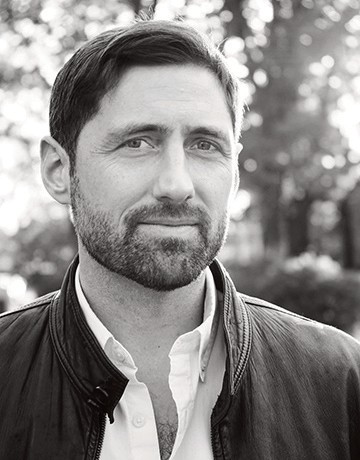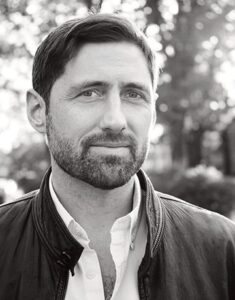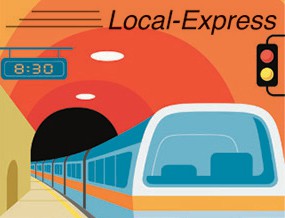Philip Klay is a novelist and essayist. His 2014 collection of stories, Redeployment, received the National Book Award for Fiction. His novel Missionaries was named one of the Wall Street Journal’s 10 best books of 2020, and listed by former President Barack Obama as one of the best books of the year. His essays and journalism have appeared in The New York Times, The Washington Post, The Wall Street Journal, The Atlantic, The New Yorker, and other places. He lives in Queens with his wife and children.
NB: Other than the amazing diversity, what do/did you love most about living in Queens (or Queens in general)? How has Queens changed over the years?
PK: It’s an amazing place to raise a family, with neighborhoods that are real neighborhoods, where people know one another and volunteer for their community. I coach soccer at my local youth league FHYAA, I’m a Cub Scout den leader in Pack 96, and when I take my kids out to play in a local park they always run into their friends, I’m always running into parents I know. Also…we’ve got to talk about the food (which of course, goes along with the diversity). Queens has the best food, at the best prices, in New York, and it’s not even close.
NB: How does Queens inspire you? What are some of your favorite places to be inspired in Queens?
PK: I love the parks. Forest Park. Flushing Meadows Corona Park. When the weather is nice I like to bike around and explore the different neighborhoods. Going to the food court in the New World Mall is such a radically different experience from getting pandebono in Corona or strolling down Austin Street in Forest Hills. The communities feel so alive here, vibrant and always changing. There’s an energy to Queens which, I hope, somehow makes it into my work.
NB: What advice do you have for readers who are hoping to develop their writing practice? Is artistic talent innate and/or can it be taught/developed? How important is daily practice? Do you ever get stage fright/camera shy/performance anxiety or have advice about overcoming it?
PK: Of course you can teach writing! I teach at Fairfield University at a low-residency MFA program and one of the delights of teaching is seeing the incredible progress students make in just two years. And yes, the discipline of daily practice is so important. Individual days of writing can be good or bad, but if you keep your butt in the seat, eventually you’ll produce work you’re proud of. I’m not particularly shy when it comes to public speaking, but I also do a lot of prep work before I do an event (I run a regular speakers series at Fairfield where I interview authors), and it helps massively to come prepared.
NB: How important is personal connection and communication (networking?) in your industry?
PK: It can help a lot in getting your work out, but you can’t network your way into writing a good sentence. First and foremost must always be the work.
NB: What is the best piece of advice you’ve ever received? What is something you wish you knew a decade or two ago?
PK: I studied with Colum McCann, a wonderful author and human being, and early on he read one of my stories and said it felt false to him. I was p-ed off. He was a civilian, he’d never been to war, knew nothing about the military, hadn’t been to Iraq, and was telling me what I’d written read false. The most obnoxious thing was that he was right. It took me a while to realize that if I wanted to write honestly about Iraq, I had to give up on the idea that who I was and what I’d been through gave me authority. I had to earn that authority on the page, with every sentence.
NB: Who are some of your favorite artists, performance artists, muralists, performers, poets, writers, editors, musicians, artists, filmmakers, actors, playwrights, professors, teachers, comedians, and other creatives with a Queens connection?
PK: I studied with Scott Cheshire, whose High As the Horses Bridles starts with an incredible scene in Queens, and Bill Cheng, a wonderful writer from Queens whose novel Southern Cross the Dog, while having nothing whatsoever to do with Queens, is great. Matthew Thomas’ We Are Not Ourselves is an incredible and deeply moving novel set in Queens, Min Jin Lee is wonderful and has written about Queens, I loved Preparation for the Next Life by Atticus Lish, which has some wonderful descriptions of Queens, and the great critic Lionel Trilling was born here.
I was lucky enough to spend time with the great photographer Tony Vacarro before he died. Tony served on the front lines of the European theater in World War II, and took incredible photographs all throughout the war, finding supplies as they went through towns and developing film in upturned helmets. Afterwards he became a fashion photographer, a career that he told me had saved his life, because it taught him that life was not just ugly, but that there was beauty here as well. He lived in Long Island City, and took me around to some of his favorite places and told me stories about all the artists he knew who’d made their home there. An incredible man.
NB: What are your favorite restaurants, cafes, theaters, bookstores, exhibits, museums, communities, and venues in Queens? Favorite places to read your work?
PK: Dani’s House of Pizza in Kew Gardens. Florist Bar and Co. in Flushing is a great cafe to work in, Bonelle Pastry Shop in Forest Hills and Cannelle Patisserie and La Nueva Bakery in Jackson Heights are great ways to get fat. Mariscos El Submarino in Jackson Heights is incredible if you can handle spicy food. Louie’s in Elmhurst looks like a standard pizza place but has incredible homemade pasta. Kew and Willow is a great little bookstore in Kew Gardens. As for museums— the Hall of Science and MoMa PS1 are great.
NB: What do you wish more people knew about being a novelist and essayist? What is something you wish you knew before you became a novelist and essayist?
PK: It’s funny, I’m stumped by this. I guess it doesn’t occur to me that people need to know much about novelists and essayists beyond the work they produce, and Margaret Atwood once said wanting to meet a novelist because you like their books is like wanting to meet a duck because you like pate. That said, I do think reading long-form writing is expansive for the human soul (especially in the current age, when technology seems to be shrinking it).
NB: Do you have any events or projects coming up that you’d like to promote?
PK: I run a speaker’s series at Fairfield called the Fairfield MFA’s Inspired Writers series. I’ll be in conversation with Paul Ellie about his book The Last Supper: Art, Faith, Sex and Controversy in the 1980s on November 17th.
NB: What is a typical day like for you?
PK: I wake up, make my kids breakfast, take them to school and then head out to write. If the weather is good I’ll sometimes run or bike to a coffee shop and work there. Then I pick up my kids, take them to soccer or Cub Scouts or Muay Thai at Kings Combat or just home to do homework.
NB: Can you tell us more about your book winning the National Book Award for Fiction, being named one of the Wall Street Journal’s best 10 books of 2020, and listed by former President Barack Obama as one of the best books of the year? What is it like to receive such stunning recognition for your work?
PK: I never imagined that my work would have the reach it has had, and it’s an intense and humbling experience. I came back from my time in Iraq with a lot of questions about what it was I had taken part in, and I found that, coming home from war, America looked a lot different as well. I began to doubt a lot of the bedrock assumptions of my life, and that could be an isolating feeling. Having been able to connect with people through the work has been an incredible privilege.
NB: What’s a wild story (PG-13) you have about New York City before the times of cell phones or social media?
PK: I’m not telling you!
NB: How do you know when your book (or piece, or any type of art) is “done” (finished editing, complete)?
PK: I’m obsessive. I do draft after draft before I ever even show it to friends, and then send the work out in stages to people I trust to give me feedback for revision.
NB: Can you tell us more about how your journalism work informs your book writing?
PK: I don’t think of writing as some solitary expression of my soul. It’s my way of trying to grapple with the world. Part of that is imaginative, but part of it is about observing the world carefully, the way a journalist does, and having the strangeness of the world before my spark something.
NB: Did you always want to be a writer? What are some of your favorite books? What authors have influenced your writing style?
PK: I’ve always loved reading. Early on, writers like Flannery O’Connor and Dostoevsky and Conrad and Graham Greene were deeply important to me. I also read a lot of poetry, and love TS Eliot and David Jones and Frank Bidart and Robert Hayden.
NB: You often write about war. What do you feel Queens residents and readers need to know about war? What intersection (if any) is there between Queens and war?
PK: We’re all American citizens, and so war is a big part of what our country has done. We have a powerful military, deeply involved with other militaries around the world, affecting multiple ongoing conflicts. And there are plenty of veterans in Queens, people who have been shaped by their service in profound ways and who enrich their community as a result. The intersection of Queens and war thus happens at a national scale, and at a very intimate one.
—Nicollette Barsamian
The Local-Express interview series was originated on July 3, 2013 by Nicollette Barsamian.



